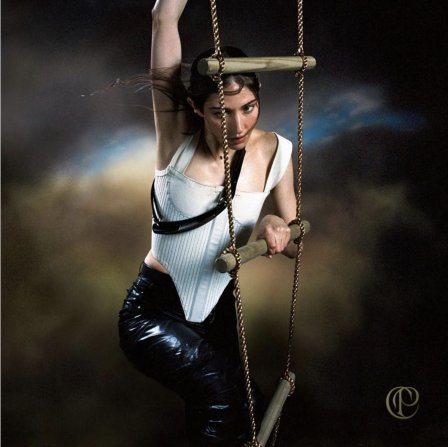Caroline, what kind of wizard are you? It’s hard to make it through Pang without repeatedly asking that question.
For a while, it seemed like Caroline Polachek’s main magic trick was disappearing. After Chairlift hung it up, she seemed to vanish into the Los Angeles aether, hiding in a studio writing songs for Beyoncé, Charli XCX, and Superfruit, releasing work so minimal as CEP and so unassuming as Ramona Lisa that it hardly registered on her considerable fanbase’s radar.
Then, in June, she opened up a “Door” to another door (“Ocean of Tears”) to another door (“Parachute”) to another door… and now we’re here with Pang, an absolute triumph of “expressionist storybook goth” that recalls the great emotive artists in pop and New Age history, from Elizabeth Fraser to Imogen Heap, Enya to her (our) girl Charli <3. Executive produced by Polachek and Danny L Harle, who here favors the sonic territory of some undiscovered ethereal paradise over the uncanny trance valley of PC Music’s Huge Danny, Pang is a revelation. Like the classic 1990s PC adventure game Myst, which is cited as an influence and whose visual direction is clearly discernible in the art and ~***vibez***~ here, Polachek has created a magical fantasy land where the openness of the journey is the point, suggesting both infinite possibility and infinite doubt, the space between knowing with absolute certainty that you’re going to survive and wondering how the hell you’re going to make it through.
It’s that tension between doubt and resolve that makes Pang so compelling, as it flits from ambient soundscapes (the trifecta of “The Gate,” “Insomnia,” and “Parachute”) to acoustic beauties (“Look At Me Now”), from self-reflexive indie pop (“Caroline Shut Up,” “So Hot You’re Hurting My Feelings”) to the kinds of twinkling, pristine bangers for which Harle’s most known (“Ocean of Tears,” “Pang”). There are steel guitars (“New Normal”), harps (“Go As A Dream”), and trap drums (“Hit Me Where It Hurts”), showcasing just how versatile Harle can be with the right collaborators, who here include A. G. Cook, Jim E. Stack, Daniel Nigro, and, of course, Polachek herself.
With a less captivating vocalist, this kind of genre-hopping might have felt inconsistent, a potpourri in constant motion, too scattered to register an impact. But Polachek’s range, her penchant for leaving her gasps and deep breaths in her vocal tracks, her carefully thought-over phrasing — these tie Pang together into one very earwormy book of spells.
It’s unclear about whom these aural tonics were crafted or whether they were even crafted about anyone in particular. In that sense, there’s something in common here with Carly Rae Jepsen’s work: this is pop music that often seems more about the relationship between singer and audience than singer and lost object of love. But there has been some kind of haunting, hard-to-shake loss here that’s no less effective for its lack of specificity, as it explores the dichotomies that haunt all of us: freedom vs. safety, fear vs. hunger, pain vs. pleasure, riding it out vs. giving up.
“Ride it out,” Caroline. As Pang makes clear again and again, you are so much more than “just another girl in a sweater.”
More about: Caroline Polachek, Chairlift, Danny L Harle




